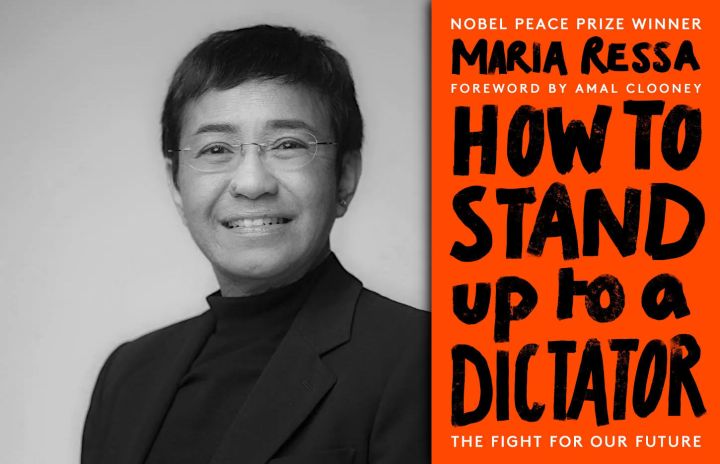BOOK EXCERPT
Nobel Prize winner Maria Ressa rails against social media disinformation in ‘How to Stand Up to a Dictator’

From the recipient of the 2021 Nobel Peace Prize, How to Stand Up to a Dictator is an impassioned and inspiring memoir of a career spent holding power to account.
In 2021, Filipino journalist Maria Ressa won the Unesco Press Freedom Award, and was one of two journalists awarded the Nobel Peace Prize.
In her Nobel lecture, she said:
“An invisible atom bomb exploded in our information ecosystem, and the world must act as it did after Hiroshima. Like that time, we need to create new institutions, like the United Nations, and new codes stating our values, like the universal declaration of human rights, to prevent humanity from doing its worst. It’s an arms race in the information ecosystem.”
Ressa’s new book, How to Stand Up to a Dictator, maps a heinous web of cause and effect that has netted the globe: from former Filipino president Rodrigo Duterte’s drug wars and their alleged extrajudicial killings, to America’s Capitol Hill, to Britain’s Brexit, to Russian and Chinese cyber warfare, to Facebook and Silicon Valley, to our own clicks and our own votes.
Ressa’s decades of work tracking the disinformation networks seeded by her own government, spreading lies to its own citizens laced with anger and hate, landed her in trouble with the most powerful man in the country: Duterte. She has multiple arrest warrants against her name, and a potential 100-plus years behind bars to prepare for. Just this week, she was acquitted of tax evasion charges, an outcome described as “a victory for press freedom in the Philippines”. But her fight is not over.
“Democracy is fragile,” she writes in How to Stand Up to a Dictator. “You have to fight for every bit, every law, every safeguard, every institution, every story. You must know how dangerous it is to suffer even the tiniest cut. This is why I say to us all: we must hold the line.” Read the excerpt.
***
Let me tell you why the rest of the world needs to pay attention to what happens in the Philippines: 2021 was the sixth year in a row that Filipinos – out of all global citizens – spent the most time on the internet and on social media. Despite slow internet speeds, Filipinos uploaded and downloaded the largest number of videos on YouTube in 2013. Four years later, 97 percent of our country’s citizens were on Facebook. When I told that statistic to Mark Zuckerberg in 2017, he was quiet for a beat. “Wait, Maria,” he finally responded, looking directly at me, “where are the other three percent?”
At the time, I laughed at his glib quip. I’m not laughing anymore.
As these numbers show and as Facebook admits, the Philippines is ground zero for the terrible effects that social media can have on a nation’s institutions, its culture, and the minds of its populace. Every development that happens in my country eventually happens in the rest of the world – if not tomorrow, then a year or two later. As early as 2015, there were reports of account farms creating social media phone-verified accounts, or PVAs, from the Philippines. That same year, a report showed that most of Donald Trump’s Facebook likes came from outside the United States and that one in every twenty-seven Trump followers was from the Philippines.
Some days, I feel like Sisyphus and Cassandra combined, trying to repeatedly warn the world about how social media has destroyed our shared reality, the place where democracy happens.
This book is my attempt to show you that the absence of rule of law in the virtual world is devastating. We live in only one reality, and the breakdown of the rule of law globally was ignited by the lack of a democratic vision for the internet in the twenty-first century. Impunity online naturally led to impunity offline, destroying existing checks and balances. What I have witnessed and documented over the past decade is technology’s godlike power to infect each of us with a virus of lies, pitting us against one another, igniting, even creating, our fears, anger, and hatred, and accelerating the rise of authoritarians and dictators around the world.
I began calling it “democracy’s death by a thousand cuts.” The very platforms that deliver the news we need are biased against facts. As early as 2018, studies show that lies laced with anger and hate spread faster and farther than facts. Without facts, you can’t have truth. Without truth, you can’t have trust. Without all three, we have no shared reality, and democracy as we know it –and all meaningful human endeavors – are dead.
We must act quickly, before that happens. That’s what I lay out in this book: an exploration into the values and principles not just of journalism and technology but of the collective action we need to take to win this battle for facts. This journey of discovery is intensely personal. That’s why every chapter has a micro and a macro: a personal lesson and the larger picture. You will see the simple ideas I hold on to in order to make what have – over time – become instinctive but thoughtful decisions, layering experiences upon new experiences of the present moment of the past. DM/ ML
How to Stand Up to a Dictator by Maria Ressa is published by Penguin Random House (R350). Visit The Reading List for South African book news, daily – including excerpts!


















 Become an Insider
Become an Insider
Comments - Please login in order to comment.